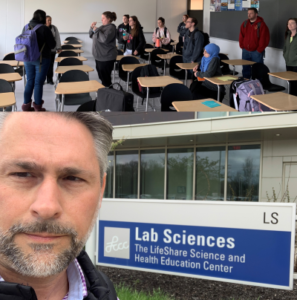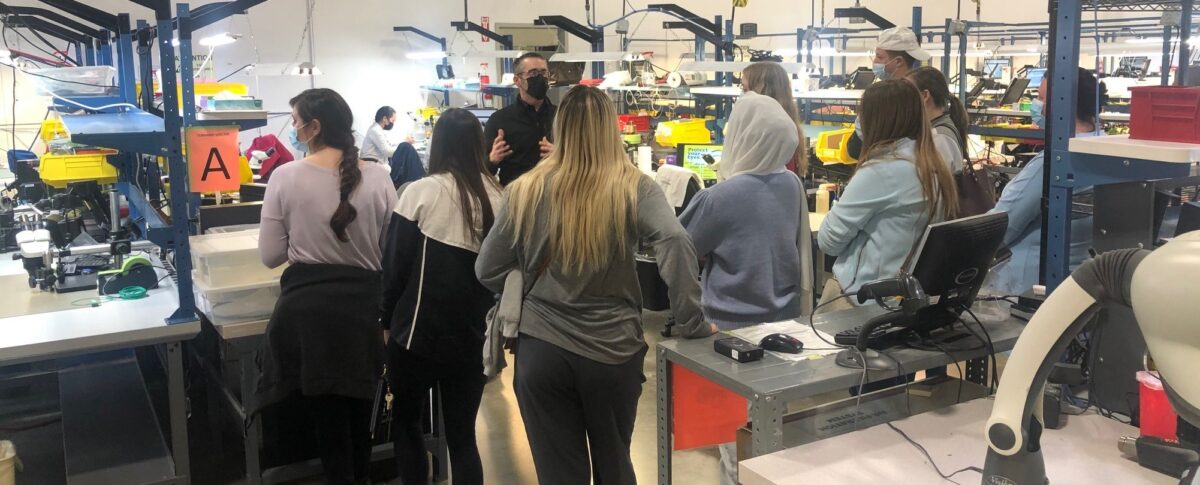Staying ahead in the medical field is all about staying informed and up to date on new developments, procedures, and processes associated with current technology. From academia to OEMs and ISOs, organizations which are continuously engaged in research and development, design, testing, and more can have a proven impact on efficiencies, costs, and outcomes. When businesses and academia work together, the results are often multiplied. Sharing Innovatus’ probe repair operations with the next generation of sonographers is making a difference one scan at a time.
Innovatus operates a program titled, Getting Schooled in Probe Repair Operations. The program is designed to provide sonography students with a hands-on experience with probe design, manufacturing, and repair. It utilizes real world scenarios, in real time, to help students more fully understand the critical nature and equipment issues they will encounter in the field. Says Innovatus clinical and technical expert Ted Lucidi, “If today’s students can better understand the importance of maintaining their devices, tomorrow’s workforce will have more control over rising healthcare costs and patient access.
Recently, we had the opportunity to have a group of senior sonography students and their instructors from Oklahoma University’s College of Allied Health visit Innovatus’ Center of Excellence for Ultrasound Probe Repair in Tulsa. Innovatus teams reinforced some of the concepts from the classroom and related them to day-to-day activities in the students’ clinical rotations.
In one segment, students learned how probes fail, the associated root causes, and best practices that can reduce long-term costs, increase efficiencies, and ultimately impact patient access. The group toured the repair center, interacted with technicians, and gained an understanding of “what’s on the inside” of the devices they handle every day.
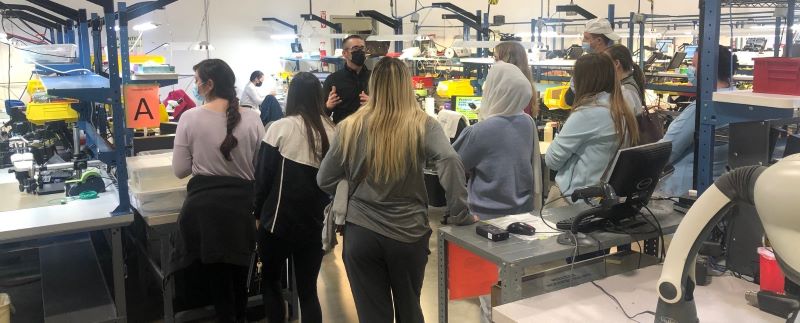
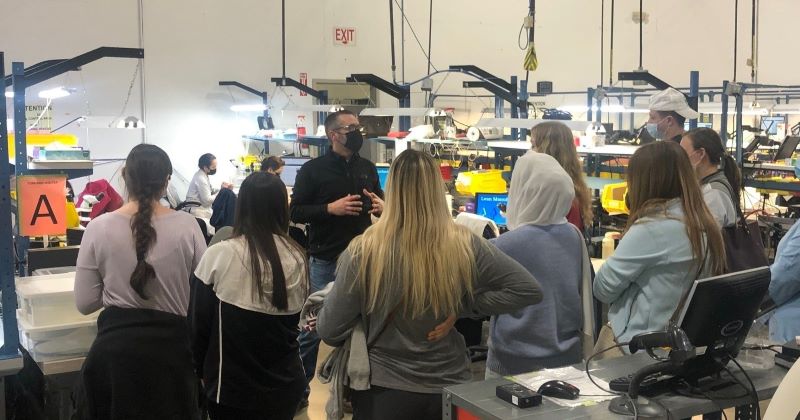
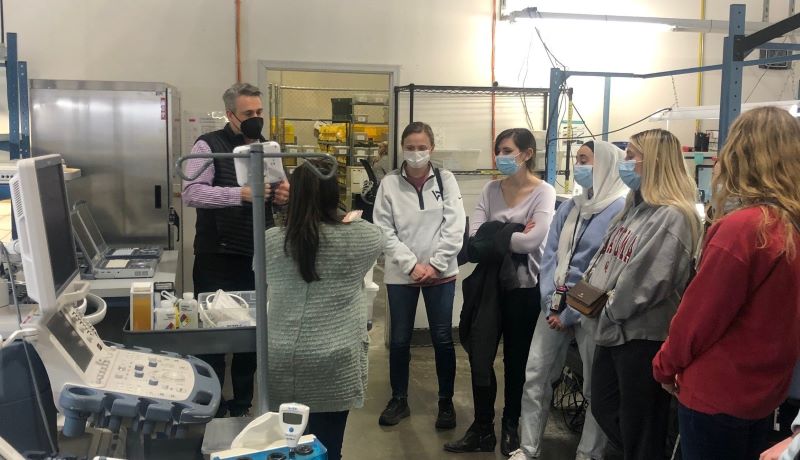
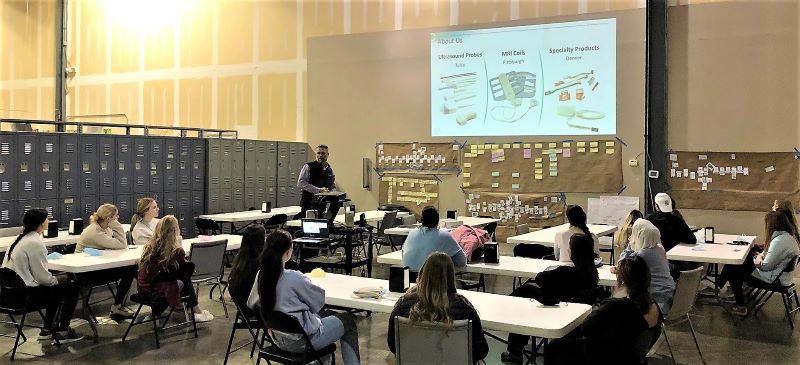
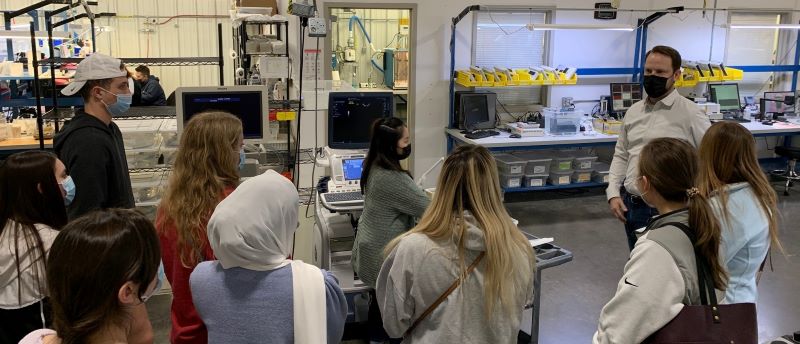
Test your “probe academics” by seeing how well you can answer the following two questions.
What is the most frequent failure of the “crystals” or acoustic array on an ultrasound probe?
Most clinicians believe that array failures are related to performance degradation or just internal failures. Although these are possibilities, most image-related failures are associated with physical damage (or accidental trauma). Adding to this confusion is the fact that, most times, there are no outward signs of physical damage to the probe’s lens or plastics when there is physical damage to one or more array elements. The thickness of the elements or “crystals” within an array can be less than 0.5mm. The force of an accidental fall to the floor is more than enough to induce significant damage to the fragile elements. The result is often, dark vertical lines/shadows in the image.
What disinfectant is best for my ultrasound probe?
There are over 100 OEM-approved chemical disinfectants for probes from which to choose, and each disinfectant has very specific instructions for use. For instance, on Philips TEE probes, there are chemicals that are acceptable for use on one area of the probe, yet not acceptable on two other areas of the probe. The process can be quite confusing. You may not know that disinfectants containing alcohols and ammonium chloride solutions can induce significant damage to plastics and rubber materials. And most importantly, you may not know that most of the disinfectants used on ultrasound probes contain these chemicals. The use of alcohols and ammonium chlorides, over time, can lead to excessive stiffness, brittleness, shrinking and staining of the lens, strain relief, sealants, housings, cable sheathings, etc.
Typically, the choices that end-users have, for disinfectants are limited by Supply Chain in combination with the Infection Control department. These departments may be more focused on efficacy and cost than on the effects to the medical devices on which the disinfectants are used. Even OEM-approved chemicals (and the methods in which they are used) have the potential to affect performance over time. It’s important to work with Supply Chain and Infection Control to source OEM-approved disinfectants with little to no alcohol and ammonium chloride content and be sure that end-users are following the recommended practices.
What efficient probe repair operations mean for you and your patients
Organizations involved with design, engineering, and manufacturing are constantly testing new ideas for products that perform better, simplify operations, increase workflow efficiencies, and reduce costs. Service providers, like Innovatus Imaging, are continuously improving and qualifying processes used to service and repair devices, the goals being to extend your device’s lifecycle and improve the sustainability of each repair.
Having teams dedicated to testing operational and performance thresholds for ultrasound probes and MRI coils of all types, makes, and models, enables the teams at Innovatus Imaging’s Centers of Excellence to develop better methodologies for device repair and inform end users of best practices and processes for care and handling that result in proven results. The above insights and practices add up to Data Driven Repair methodologies gleaned from over 30-years of research, design, testing and successful outcomes.
The vast body of knowledge moving our industry forward continues to grow as OEMs, ISOs, and academia continue to work together to learn, create and test best practices for increasing efficiencies and outcomes for patients. As a result, Innovatus Imaging is dedicated to engineering new methodologies and working with universities through our “Getting Schooled in Probe Repair Operations” program to set up better outcomes for the present and future.
Want to know more about our probe repair operations?
Don’t allow physical location to limit the possibilities. This program can be performed totally virtual, including the tour of our facility. although initially designed for sonography students, it’s perfectly suited for those already in the field. It’s never too late to contribute to cost reduction.
If you are an instructor, student, or healthcare professional who believes that your teams would benefit from our Getting Schooled in Probe Repair Operations program, please reach out to training@innovatusimaging.com for more information.
